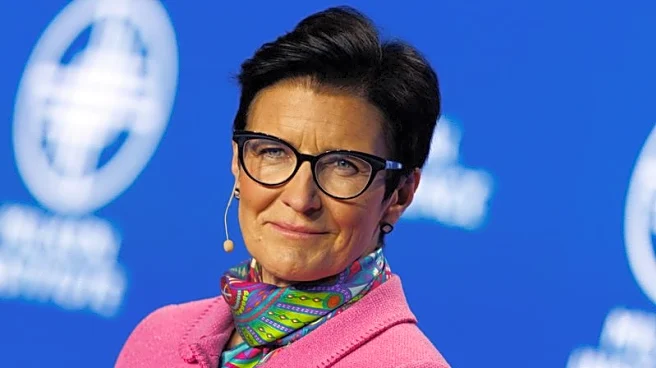What's Happening?
Peacock's psychological thriller 'All Her Fault' delves into the panic and uncertainty faced by Marissa Irvine, played by Sarah Snook, when her son Milo goes missing after a playdate. The storyline unfolds as Marissa discovers that the playdate was never
arranged by the other child's mother, Jenny Kaminski, and the tracker in Milo's backpack is offline. The narrative, inspired by real-life events experienced by author Andrea Mara, explores themes of parental trust and safety. As the search for Milo intensifies, detectives become involved, and Jenny's nanny, Carrie Finch, emerges as the main suspect. The show reveals deep secrets and cracks in the Irvine family's seemingly perfect world, culminating in a dramatic and tragic conclusion.
Why It's Important?
The series highlights the growing concerns among parents regarding the safety of their children in everyday situations such as school, playdates, and parties. It raises questions about the trust parents place in others and the measures they take to ensure their children's safety. The show also touches on the psychological impact of such incidents on families and the broader societal implications of parental anxiety. By dramatizing these issues, 'All Her Fault' prompts viewers to reflect on the complexities of modern parenting and the challenges of safeguarding children in an increasingly uncertain world.
What's Next?
The show's conclusion leaves viewers with unresolved questions about the characters' futures and the long-term effects of the traumatic events depicted. As the series ends with Marissa and Jenny watching their sons play together, it suggests a return to normalcy but also hints at the lingering emotional scars. The narrative invites further exploration of the themes of trust, safety, and the psychological aftermath of such incidents, potentially influencing future discussions and portrayals of parental concerns in media.
Beyond the Headlines
The ethical and legal dimensions of the story are significant, as it explores the consequences of actions taken in desperation and the moral dilemmas faced by the characters. The show's portrayal of the nanny's psychological instability and obsession with Milo raises questions about mental health and the support systems available for individuals experiencing trauma. Additionally, the narrative's focus on parental anxiety reflects broader cultural shifts towards heightened vigilance and protective measures in child-rearing practices.
















